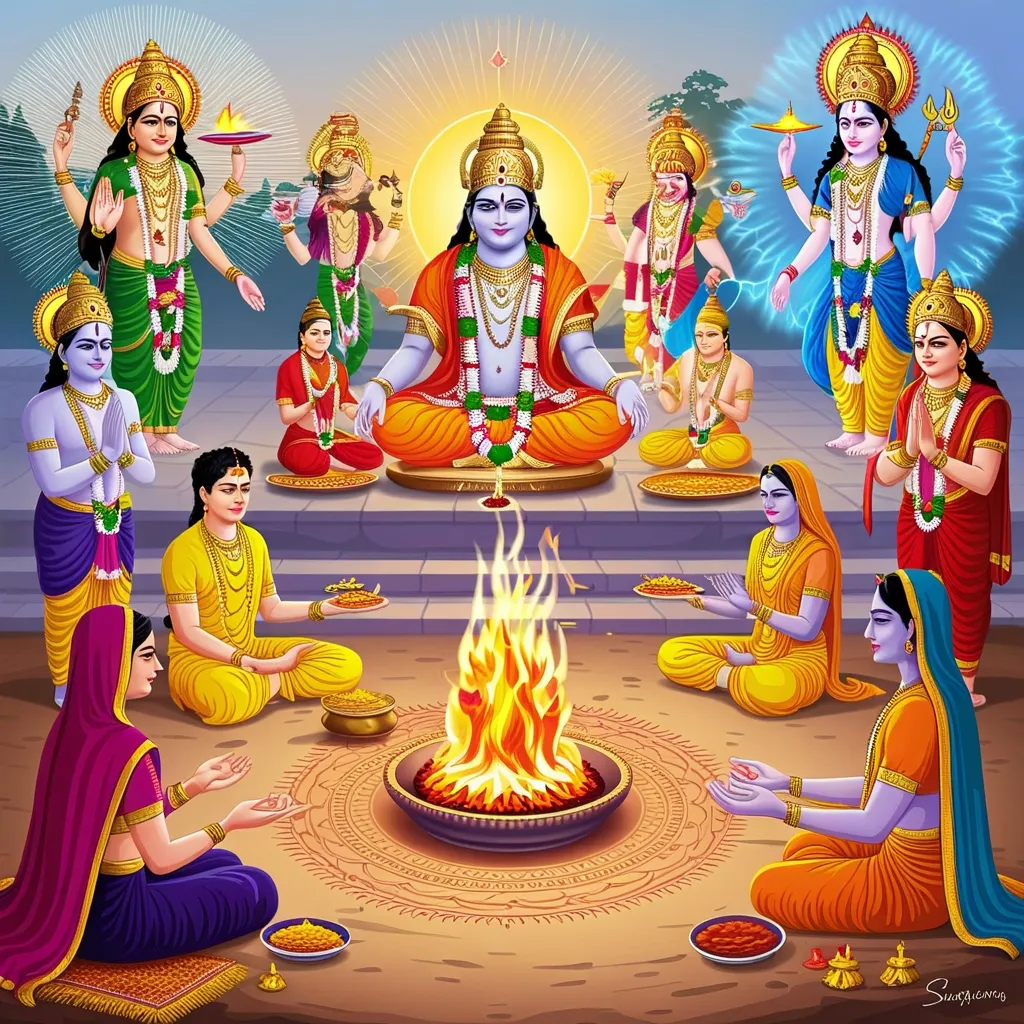In the sprawling and timeless expanse of Hindu sacred texts, the Yajurveda stands tall as a fundamental pillar of ritual and spirituality. This Veda, translating to “the Veda of the Yajus,” houses a rich collection of prose mantras essential for various worship rituals. A recurring theme in the Yajurveda is the invocation of divine deities, highlighting a deep-rooted belief in their power to protect and bless devotees.
The deities play a pivotal role in the Yajurveda, each one embodying unique attributes and functions. Take Savita, the Sun god. He is frequently invoked for his ability to kickstart and guide rituals. In the Taittiriya Samhita, a prominent text within the Yajurveda, Savita is celebrated for bringing light and strength, making him indispensable in rituals aimed at securing good fortune and wealth.
Agni, the fire god, is another prominent figure in Yajurveda rituals. Known as the mediator between humans and gods, Agni’s presence is vital for the success of any yajna (sacrificial ritual). The mantras often call upon Agni to dispel evil spirits and ignite the fire that facilitates offerings to the gods, ensuring the sacrificer is purified and protected.
Protection against evil spirits is a significant aspect of the Yajurveda. Numerous rituals are designed for this purpose. For instance, the Agnicayana ritual involves specific mantras to channel the gods’ power, especially Agni, to fend off evil entities. These mantras underscore the importance of purification and Agni’s role in safeguarding the ritual and its participants.
Another notable example is the invocation of Gayatri Devi, the Mother of the Vedas. Yagnavalkya, a revered sage, sought Gayatri’s guidance after renouncing his teacher, Vaisampayana. Gayatri, in her nurturing form, directed Yagnavalkya to seek wisdom from Surya Bhagavan, the Sun god, ensuring his spiritual and ritual protection.
The Yajurveda also outlines various rituals aimed at ensuring safety and prosperity. The Darṣapūrṇamāsa rituals, for example, are performed on full and new moon days, involving offerings of cow milk to the fire. These rituals aim to maintain harmony and balance, ensuring the well-being and protection of the sacrificer and his family.
Another key ritual is Pravargya, where cow milk and grains are offered to the yajna fire. This ritual specifically seeks to bring about longevity, health, strength, prosperity, security, tranquility, and contentment — all facets of divine protection.
Beyond Savita and Agni, other deities are also invoked for protection and safety. Indra, the king of the gods, is often called upon for his might and power. Prajapati, the creator god, is invoked for his role in maintaining cosmic order and ensuring the land’s fertility and prosperity.
Rudra, another significant deity, is associated with protection and healing. The Rudram, a part of the Yajurveda, is a powerful invocation of Rudra’s blessings and protection from harm. This chant is often performed during rituals to cleanse negativity and invoke divine protection.
The mantras in the Yajurveda are more than just words; they are believed to possess the power to invoke the divine. Typically set in meter, these mantras are recited with deep devotion and faith. The Gayatri Mantra, for instance, a 24-lettered mantra, is considered one of the most potent for protection and spiritual growth. Reciting it at least 108 times daily is recommended to fully benefit from its power.
The principles of the Yajurveda aren’t restricted to ancient rituals; they have real-world applications. For example, the daily Agnihotra ritual emphasizes purification and protection, where milk is offered to the fire. This ritual is believed to purify the environment and bring a sense of well-being and safety.
Even in modern times, these rituals and mantras remain relevant. Many people participate in Yajnas and recite Vedic mantras to seek divine protection and blessings. These practices are believed to create a positive atmosphere, repel negative energies, and bring about peace and prosperity.
In essence, the Yajurveda is a rich tapestry of rituals, mantras, and invocations aimed at securing divine protection and safety. Through the invocation of various deities and the recitation of powerful mantras, the Yajurveda offers a comprehensive framework for spiritual growth and protection. Whether it’s invoking Savita for strength, Agni for purification, or Gayatri for spiritual enlightenment, the Yajurveda provides numerous ways to connect with the divine and seek safety and prosperity in all aspects of life. These ancient practices continue to inspire and guide people, reaffirming the enduring power of faith and devotion.
For those seeking to delve deeper into the Yajurveda, it’s like embarking on an enriching journey of spiritual discovery. The text’s intricate rituals, profound mantras, and the divine presence of revered deities weave a complex yet accessible framework for anyone interested in exploring Hindu spirituality. Perhaps, more than a religious duty, it’s about finding a personal connection and reassurance in the power of age-old practices that have withstood the test of time, offering comfort and protection from the unseen. So, whether you’re reciting the Gayatri Mantra in the quiet of the morning or participating in a grand yajna, remember that these practices aren’t just about looking back; they’re about finding continual relevance and connection in the rhythms of daily life.






